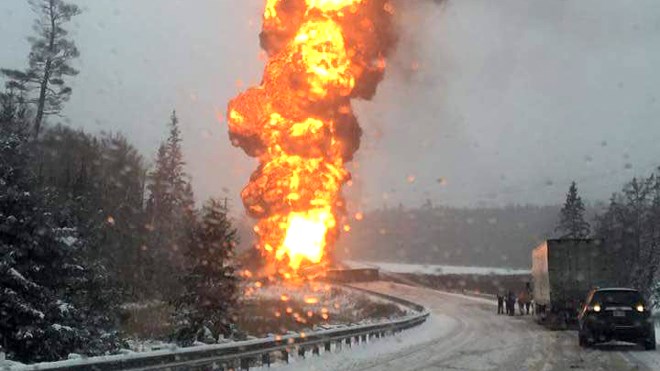In the aftermath of a fiery explosion resulting from the collision of two transport trucks that left one man dead on Highway 11 north, late last month, the OPP and the Ministry of the Environment have extended professional tributes to North Bay Fire & Emergency Services (NBFES).
The first OPP officers on scene asked for a North Bay truck to respond, and the request was then upgraded to include a hazardous materials (HAZMAT) team. NBFES is a Level 2 HAZMAT-trained unit, that can be activated by the province of Ontario at any time.
"It was a catastrophic scene. The host department, it was beyond their capability. The OPP said that once the North Bay crew arrived, it was just a world of difference as we took command and started mitigating the situation," said North Bay Fire Chief Jason Whiteley.
Off-duty NBFES personnel were called in to cover for the crews at the accident scene, in the case of any emergency calls in the city, as well as to relieve the crews working on the highway, who assisted the OPP well into the evening after the morning accident.
The Ministry of the Environment personnel hailed the North Bay HAZMAT team for their management of the situation, and for minimizing environmental damage resulting from the crash and subsequent explosion.
Whiteley noted that the department will seek reimbursement from provincial levels to cover the costs associated with the incident.
Chief Whiteley stressed that this is not a slight to smaller volunteer services. "They've got good people that are volunteering their time, they just don't have the training or the capacity," adding that when incidents such as the tanker explosion occur, career firefighters are the only trained units capable of handling them.
Whiteley said that in his first two months on the job, he has noticed that, "Efficiencies are being looked for, here in the city. Volunteer fire departments are looked at as a cost-savings. Yes, if you're not paying people the same amount of money, there are savings. That comes at a cost, as well. The capabilities and the level of service," being two examples, said Whiteley.
"That's what you get here in North Bay. You get a higher level of service, professional people who are trained, and continue training, and are running a lot more calls, over 1,500 per year," whereas Marten River (who initially responded to the tanker explosion) might attend 20-30 in the same time frame, said Whiteley, adding, "that's where this accident really showed that difference."
Whiteley says that the term "volunteer" is misleading. "Everybody forgets that there's a cost to training people, there's a cost to equipment. Volunteers aren't free, some are making in the range of $27-29 per hour. There are very few true volunteer departments. The volunteers in Sudbury are unionized."
Continued Whiteley, "There's a different level of service for volunteer departments. You look at St. Charles about a month ago, unfortunately, there was a fire fatality there. Three people showed up to the fire. That's what you risk is lower level of response and higher response times."
"I'm trying to educate people on how we manage risk. We've got two major highways that run through this town, three different railways. We've already had a train derailment here in North Bay this year. Luckily, it was north of the city," observed Whiteley.
"What would happen if that derailment happened around the ONR yards with a tanker full of harmful materials? What if the tanker collision and explosion that we responded to near Temagami happened at Seymour and the Bypass? Or downtown? These are the things that worry me as the Fire Chief, because that's my job, to mitigate risk.
"We try to plan with manpower, response capabilities, station placements. Fire services are expensive," said Whiteley, but scaling back means dramatic service level changes.



.jpg;w=120;h=80;mode=crop)